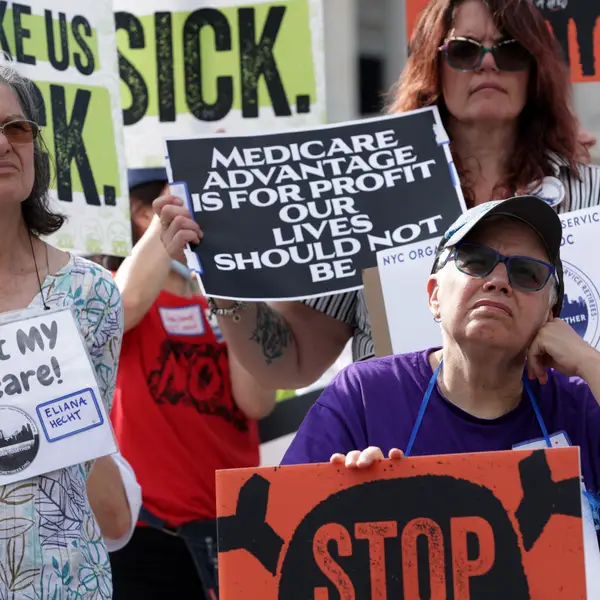A signature exchange early in the first Senate hearing Wednesday for Rep. Tom Price in his nomination to be the next Health and Human Services Secretary illustrates a lot about our still damaged healthcare system, and how it could now get much worse.
Sen. Bernie Sanders, whose call to expand coverage through an improved Medicare for all was a centerpiece of his presidential campaign, forcefully challenged Price to commit to guaranteed healthcare for every American.
Sanders: The United States of America is the only major country on earth that does not guarantee healthcare to all people as a right. Do you believe that healthcare is a right of all Americans, whether they are rich or they're poor? Should people, because they are Americans, be able to go to the doctor, be able to go into a hospital because they are Americans? In Canada, in other countries, all people have the right to get healthcare. Do you believe we should move in that direction?
Price: I believe that every single American has access to the highest quality care and coverage that is possible.
Sanders. 'Has access to' does not mean that they are guaranteed health care. I have access to buying a $10 million home; I don't have the money to do that.
Unpack the evasions and you have the Ayn Rand-Tea Party philosophy in a nutshell. You only deserve the healthcare you can buy, from private insurance companies that have a history of price gouging with multiple restrictions on the care you can receive even after paying your premiums.
"Access to care" in the mouths of those devoted to shredding every vestige of our healthcare safety net only serves as a pointed reminder of the elevation of double speak for an incoming administration whose press secretary, Sean Spicer, can praise the "totality of diversity" that is "second to none" for a Cabinet where 13 of 16 nominees are white men. Or perhaps Spicer just meant the "diversity" of both millionaires and billionaires.
Any notion that the private healthcare market, which has long prioritized its profiteering above any guarantees of access, cost, or quality, will somehow do a better job of assuring "every person the financial feasibility to purchase the coverage they want" requires a suspension of disbelief that is truly Orwellian.
Probably the best evidence of the failure of the market-driven system - which saw the U.S. fall to 37th in the world according to a World Health Organization ranking early in this century - is the decades long push for major healthcare reform.
The Affordable Care Act was a step forward, especially in access, through the expansion of Medicaid for many low and moderate income adults, and a ban on some of the worst insurance abuses that permitted more people to buy insurance plans through the ACA market exchanges.
Significant holes in the ACA, especially the failure to adequately control out of pocket costs for millions of people, opened the door to much of the attacks, as hypocritical as the ideological resistance has been from those in Congress to a plan that was evolved from conservative think tanks and designed to meet the desires of the healthcare industry.
Now, with the rush to repeal the ACA, things are in danger of getting very ugly fast.
Incoming President Trump did throw a wrench into the feeding frenzy in a series of statements insisting that the Republican majorities in the Senate and House adopt a concurrent replacement plan with repeal of the ACA.
Further he set conditions, that no one lose coverage they've gained under the ACA, and that premiums and deductibles be lowered.
That has made it sticky for the repeal and replace crowd. Not one scheme they have talked about the past eight years comes close to meeting those barometers.
Not health savings accounts or tax credits to buy insurance without any controls on the predatory pricing practices of the industry.
Not "selling insurance across state lines" which is merely a race to the bottom, letting insurance giants decamp in the least regulated states so that other states, with stronger public protections, must accept those same lowered standards.
And not converting Medicaid to block grants, which Price, and now Trump as well, are proposing as a "solution" for expanded coverage.
The Medicaid block grant proposal is intended to sharply reduce federal funding for Medicaid, and then leave it to states, more than half now controlled by conservative budget hawks, to reduce their commitment to health coverage for low and moderate income people by restricting eligibility and cutting covered benefits.
Sanders also pressed Price on whether he would adhere to another Trump promise not to cut Medicare and Medicaid.
And then there was this exchange, where Sanders pointed out another Trump call for increased negotiations to reduce prescription drug prices, which would be a sharp u-turn for Congressional conservatives who have repeatedly blocked the ability of Medicare to negotiate discounts as most other countries do.
Sanders: Will you work with us so that Medicare negotiates prices with the pharmaceutical industry
Price: You have my commitment to work with you and others to make certain that the drug pricing is reasonable and that individuals have access to the medications that they need.
There he goes again. "Access" to medications may mean you can stand in a pharmacy and admire the drugs on the shelves, but it still does not mean you can afford the massive price gouging to get them.



